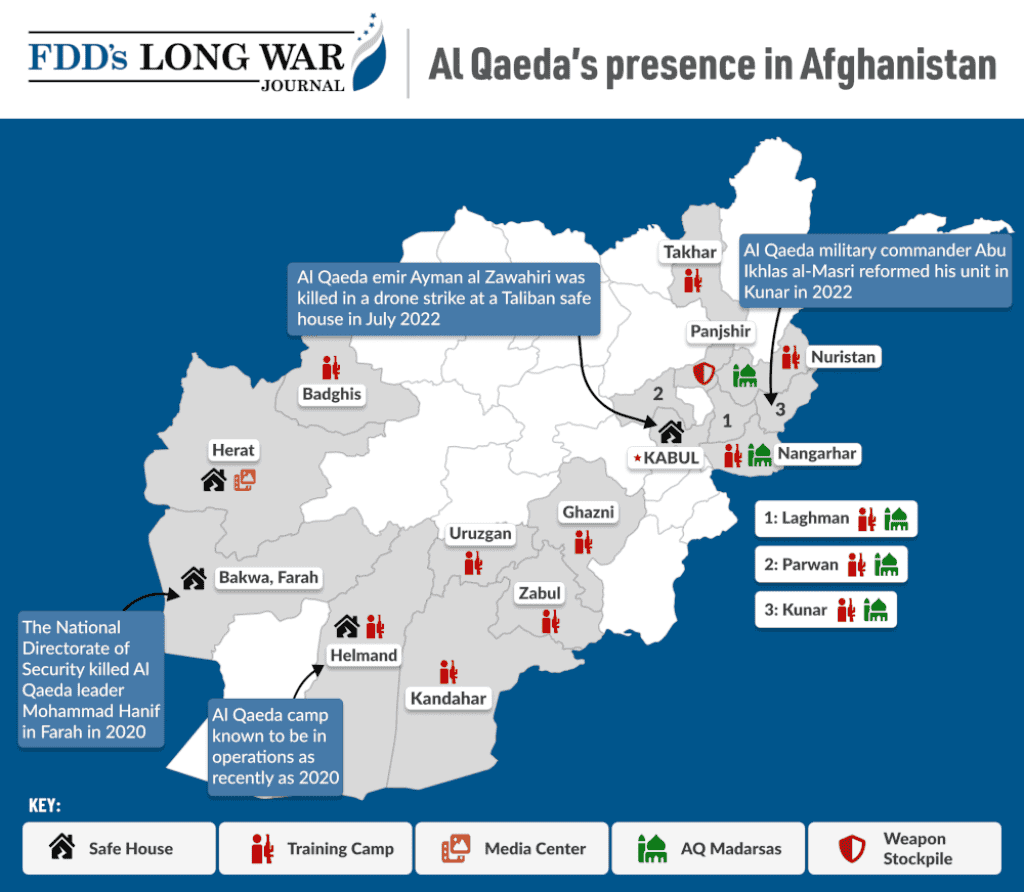
Al Qaeda is operating training camps in the Afghan provinces of Kandahar and Takhar, the United Nations Analytical Support and Sanctions Monitoring Team reported. These facilities are in addition to those located in 10 other provinces that the Monitoring Team identified over the past year. Additionally, the Monitoring Team notes that Al Qaeda “still uses Afghanistan as a permissive haven under the Taliban.”
The Monitoring Team disclosed the presence of new Al Qaeda training camps in its latest 1267 report on Afghanistan on July 10.
Al Qaeda now operates training camps in 12 of Afghanistan’s 34 provinces. In its previous two reports, the Monitoring Team reported that Al Qaeda had camps in Ghazni, Laghman, Parwan, Uruzgan, Helmand, Zabul, Nangarhar, Nuristan, Badghis, and Kunar.
Al Qaeda’s growing infrastructure contradicts claims that the Taliban is constraining the terrorist group
Al Qaeda’s infrastructure in Afghanistan continues to expand, despite the Monitoring Team’s claim that “the Taliban have done much to constrain the activities of Al-Qaida and their affiliates.” The UN organization then seemingly contradicts itself when it notes that “Member States remarked that its reorganization and training activities, as well as new travel into Afghanistan, indicate that the group still uses Afghanistan as a permissive haven under the Taliban, raising questions about Al-Qaida’s intent.”
The previous two Monitoring Team reports note that Al Qaeda has established safe houses, religious schools, a media operations center, and a weapons storage facility.
Taliban safe houses were identified in the provinces of Farah, Helmand, Herat, and Kabul. Ayman al Zawahiri, the co-founder and previous emir of Al Qaeda, was killed in a US drone strike on one such safe house in Kabul in July 2022. That safe house was operated by a lieutenant of Sirajuddin Haqqani, who is one of the Taliban’s two deputy emirs and its current interior minister. The US State Department lists Sirajuddin’s powerful Haqqani Network as a Foreign Terrorist Organization for its close ties to Al Qaeda. Sirajuddin and many of his top lieutenants are also labeled as Specially Designated Global Terrorists by the US Treasury Department.
The safe houses in Farah, Helmand, and Herat are used by Al Qaeda “to facilitate the movement [of members] between Afghanistan and the Islamic Republic of Iran,” the Monitoring Team reported in January 2024.
Al Qaeda is also operating madrasas (religious schools) in Laghman, Kunar, Nangarhar, Nuristan and Parwan provinces. In the central province of Panjshir, the former bastion of the anti-Taliban National Resistance Front, Al Qaeda has established a base “to stockpile weaponry.”
In addition to Al Qaeda’s burgeoning terror infrastructure in Afghanistan, Al Qaeda leaders serve in the Taliban’s government, the Taliban issues passports and national identification cards to Al Qaeda members, and the Taliban is using Al Qaeda training manuals in its Ministry of Defense.
The UN report neglects to mention the Al Qaeda emir’s call for supporters to flock to Afghanistan
In early June, Sayf al Adl, Al Qaeda’s presumptive emir, published an article at as-Sahab, the terrorist group’s official media arm, entitled, “This is Gaza: A War of Existence, Not a War of Borders.” In the article, Adl states that “the loyal people of the Ummah [worldwide Islamic community] interested in change must go to Afghanistan, learn from its conditions, and benefit from their [the Taliban’s] experience.”
Adl’s call for supporters to travel to Afghanistan to gain training, experience, and knowledge before undertaking attacks against so-called “Zionist” and Western targets around the world is not mentioned in the latest Monitoring Team report. However, this omission may be due to the timing of the release of Adl’s article and the report’s release.
The Monitoring Team notes that “Member States” have “questions about Al-Qaida’s intent.” It also assesses that “Al-Qaida capacity to conduct large-scale attacks continues to be limited, while its intent remains firm, bolstered by its affiliates’ abilities to carry out external operations.”
It is far more likely that Al Qaeda is holding its fire and limiting plots emanating from Afghanistan to maintain its relationship with the Taliban and secure its safe haven rather than the group having an issue with “limited” capacity.
Adl’s call for jihadists worldwide to flock to Afghanistan, coupled with Al Qaeda expanding its terror infrastructure in a “permissive haven under the Taliban,” should remove all doubt about Al Qaeda’s intent and ability to plan, train, and attempt attacks emanating from Afghan soil at a time of its choosing.
Also, see the LWJ reports:
Al Qaeda opens 8 new training camps, 5 madrasas, and a facilitation network to Iran in Afghanistan
Al Qaeda actively operating training camps in 5 Afghan provinces
Afghan Taliban and Al Qaeda aiding Pakistani Taliban’s insurgency
Al Qaeda leaders are prominently serving in Taliban government







